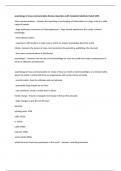psychology of mass communication Review Questions with Complete Solutions Rated 100%
Mass communications - Answers the imparting or exchanging of information on a large scale to a wide
range of people.
-huge audiences (anonymous & heterogeneous) = huge shared experiences the create a shared
knowledge.
-international culture
-experience with media is a major way in which we acquire knowledge about the world
Media - Answers the means of mass communication (broadcasting, publishing, the internet)
-how mass communications is distributed
psychology? - Answers how we act on this knowledge (or react to) could have major consequences in
terms of attitudes and behaviors
-psychology of mass communication ns: study of how our minds create knowledge, or a mental reality,
about the world, constructed from our experiences with various forms of media.
-mental reality= basis for attitudes and our behavior
-potentially huge impact on our lives
-can sometimes create a reality that is untrue
media change - Answers changed enormously in the last few decades
-huge changes in just the last 20 years
timeline:
printing press 1456
radio 1920s
tv 1950s
cable 1980s
internet 1990s
social media 2000s
which form do Americans participate in the most? - Answers -watching television
,-do this more than almost everything else (except for sleeping and working- Bureau of labor statistics,
2015 Roberts, 2000)
-15to 20 hrs of the 39 hours of free time
-transformed day-to-day life of more people than perhaps ANY invention in human history
-Internet
-catching up
-experts: computer-mediated communications may well be on their way to eclipsing television in terms
of transforming society
what drives mass media? - Answers $$$$$
-tremendous pressure for media to be as entertaining as possible to as many people as possible
-the pressure to entertain, also holds true for traditionally non-entertainment like concepts
-news
what drives it continued? - Answers -economic pressures (and sometimes political and ideological)
influence the content of media
-magazines that accept tobacco advertisements print fewer stories about the health risks of smoking
than those that have no cigarette ads ( Lee & Solomon, 1991; Strasburger & Wilson, 2002)
-ABC- owned by Disney- got rid of any negative stories on Disney theme parks (Steyer, 2002)
-media contains both blatant and subtle censorship
censorship - Answers Major philosophical and legal issues
-Varies greatly in different societies
-example: Totalitarian societies= approval of all content before broadcast or publication
,-subtle forms exist in ALL nations
-Primetime TV= rare to hear sh*t, f*ck, or other derogatory slurs
-60 years ago= NO: damn, hell, or pregnant BUT YES: racial slurs: n-word, wetback, nap
Advertisement companies= may influence the media we see that many of us do not realize.
-Many products to sell= BIG budgets
-can threaten to pull their advertisements, and thus their $$$$
reciprocity - Answers necessary for some kind of response from the audience
-media users= often comically portrayed as passively viewing content
-reality is far from mindless absorption
-reality and meaning construed by viewer
-movie with sexual assault X viewers experiences
-personal experiences, culture, knowledge
reciprocity: Media becomes reality - Answers some celebrities are almost entirely media creations
(reality TV, Kardashians, Jersey Shore, viral video stars)
nature of media consumption - Answers social situation: who is watching, listening, reading, and how
they react affects media consumption experience
-solo activities (usually): reading newspaper, scrolling through social media, magazines
-what happens when we add other people into our media consumption?
-what happens when we add other people into our media consumption? - Answers -sporting events
-different behavior when watching alone on tv, at bar with friends, at stadium
-horror movies
, -experience can change with he people around you
-enjoyment & level of fear when watching a horror film is affected by the responses of those around
you
-shrieks in fun, cries of distress, laughs, shows no reaction
-types of movies and type of people watching with affects behavior (Harris and Cook, 2011)
-college students found watching sexual R-rated movies with their parents by far to be the most
uncomfortable combination.
uses of Mass Communication - Answers traditionally two categories
-print (e.g. newspaper)= paper copies that are relatively permanent and require audience literacy
-electronic (e.g, shows)= with invention of the internet becoming more permanent
-more recent
-less dependent on literacy
newspapers - Answers -primarily used as a new source
-most income from ads
-newspaper ads seen more favorably by public than TV ads--seen as less intrusive, more informative
-daily circulation 62 million 1990, 46 million 2010
-huge age differences
% reading newspaper, print
-age 65+: 62%, age 35-44: 34%, age 18-34: 25%




